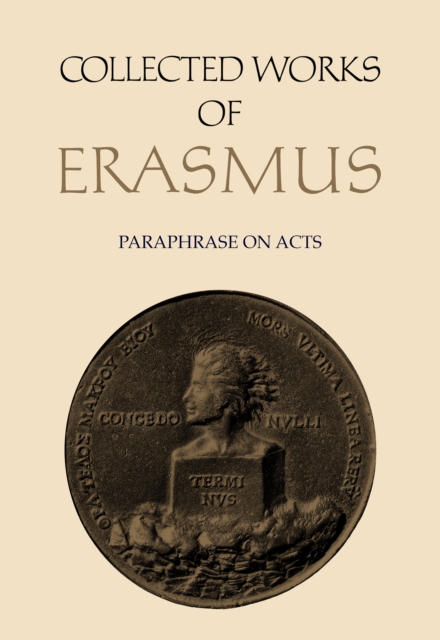
Collected Works of Erasmus : Paraphrase on Acts, Volume 50 Hardback
by Desiderius Erasmus
Edited by John J. Bateman
Part of the Collected Works of Erasmus series
Hardback
Description
Erasmus yearned to make the Bible an effective instrument in the reform of society, church, and everyday life.
He therefore composed Paraphrases in which the words of Holy Scripture provided the core of a text, vastly expanded to embrace the reforming `philosophy of Christ.' The Paraphrases were successful beyond all expectations, and were quickly translated into French, English, and other languages.
The Paraphrase on Acts is the fifth volume of Paraphrases to be published in the New Testament Scholarship series in the Collected Works of Erasmus. The highly dramatic narrative of Acts offered Erasmus as paraphrast a treasury of golden opportunities.
Its personae are kings, governors, high priests, communities of grace, and the ubiquitous and volatile mob.
Here are the models to be emulated and to be avoided in both a reformed Europe and a reformed church.
In the Paraphrase on Acts the splendour of popes is measured against the simplicity of St Peter, the pride of European kings warned against by the downfall of Herod . The Paraphrase on Acts commands attention also by its manifest efforts to rationalize biblical history.
Erasmus persistently shows that the guidance of the Holy Spirit is nevertheless complemented by very human motivations.
Moreover, the impressionistic framework of time and space in the biblical account is replaced in the Paraphrase on Acts by a careful definition of events by date and location - offering fascinating insights into the science of geography in Erasmus' day. The reader will recognize many of Erasmus' favourite theological themes, for example the sharp antithesis between faith and ceremonial works.
But it is perhaps Erasmus' portrait of the Holy Spirit that will leave the deepest impression - a portrait in which images of fire turn imperceptibly but decisively into ontological realities and moral imperatives. Volume 50 of the Collected Works of Erasmus series.
Information
-
Available to Order - This title is available to order, with delivery expected within 2 weeks
- Format:Hardback
- Pages:389 pages
- Publisher:University of Toronto Press
- Publication Date:16/03/1995
- Category:
- ISBN:9780802006646
Other Formats
- PDF from £103.70
Information
-
Available to Order - This title is available to order, with delivery expected within 2 weeks
- Format:Hardback
- Pages:389 pages
- Publisher:University of Toronto Press
- Publication Date:16/03/1995
- Category:
- ISBN:9780802006646










